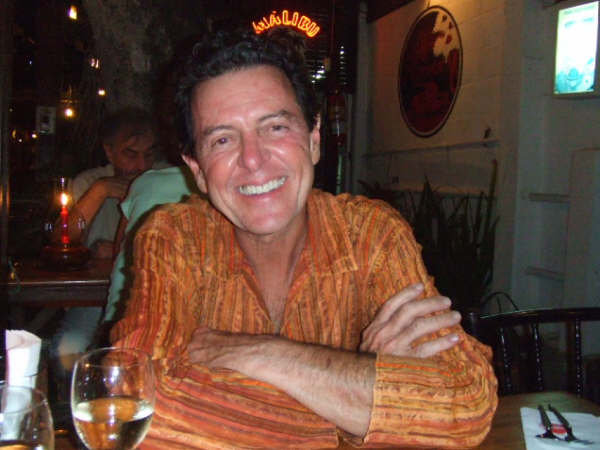A Remarkable Man
Tim LaRocco looks at the NGO industry in Cambodia and finds a remarkable man a world away from the fat salaries, colonial lifestyles and dishonest fundraising that have come to typify the aid sector.
I first met Johnny Phillips in March 2012 at a nondescript Khmer eatery on St. 13 which has since been demolished. I had been tasked with tracking down the directors of a few non-governmental organizations operating in Phnom Penh as part of a topical piece I was writing on the subject for an American publication.
The two previous days I had met with three executives of various NGOs and found the whole process tedious; the men I talked to hostile and aloof. One supercilious vice president of a non-profit abruptly, albeit somewhat politely, ended my interview with him when I asked an innocent question pertaining to the Lexus RX he drove. I nearly cancelled my appointment with Mr. Phillips due to the sentiment of exasperation and antipathy I felt towards the story I was working on. But I did show up to our luncheon that day, however, and I am grateful that I did.
Sitting sage-like on the plastic chair at his table and continuously swirling his tea with a spoon, my first impression of Johnny upon entering the restaurant was one of a man with enough tales of tragicomedy to fill a large book. His tired, weathered face, watery eyes, and managerial spectacles only reinforced that perception.
An American in his mid-60s, Johnny’s journey to Cambodia was the latest stop on a long, sinuous path beginning in the U.S. rustbelt and passing later through the Languedoc in the south of France and Chiang Mai in northern Thailand. A commercial restaurateur by trade, Johnny affably explained the mix of successes and failures he had experienced in the food and beverage industry during our initial get-together to set the prologue for this particular autobiography. After selling his shares in an Oklahoma real estate venture, he moved to Caune-Minervois and just “drank cheap wine for five years,” he elucidated with gleeful reminiscence. Following that, he moved again to the Land of Smiles to seek companionship before eventually coming to Cambodia.
At this point in painting the illustration of his life’s story, Johnny’s mood began to alter discernibly. His glass-like eyes filled with a dark glow of melancholy as he gazed myopically into the middle-distance of our table, ruminatively lamenting his financial decisions upon arrival in the Kingdom of Wonder. He had achieved what many Westerners at his age dream of accomplishing: a lucrative ending to his professional career, and prospects of a relaxing life of serenity abroad. Armed with enough savings to spend his twilight years in comfortable retirement in the agreeably warm climate of Southeast Asia, it should have been smooth sailing on calm seas until Johnny’s date with Saint Peter. But it wasn’t.
I listened acutely as he continued on with this soliloquy in the didactic fashion of a tenured professor. Apparently, it was a trip to Sihanoukville and a confrontation with Cambodia’s shocking poverty which ultimately changed Johnny’s destiny. While trying to enjoy the famous $3 barbeque one night on Serendipity Beach, he related to me how he was constantly being badgered by beggar kids looking for morsels of food. One particularly desperate child was so hungry, Johnny pensively recalled, that he grabbed a discarded pork chop bone off of the plate and began gnawing on it.
People have certain ways of hiding their raw emotions. I noticed during this encounter that Johnny’s was to devote his energy to stirring his tea, his eyes fixed attentively on the cup, as he introspectively took stock of the impact which that night had on his life. I was somewhat embarrassed to admit to him that had I been in Johnny’s position that night on the beach, my first instinct might have been to assume the bone gnawer was performing a melodramatic skit for sympathy and some pocket change. But I recognized that this was a man who was completely and thoroughly sincere in his empathy and kindness. In my interactions with the NGO crowd, those are pretty rare characteristics. What is even rarer was that he acted on these feelings.
A well-intentioned idea proves expensive
In October 2011, Johnny founded Buckhunger, a non-profit soup kitchen which provides healthy meals to Phnom Penh’s impoverished street kids. An earlier mission statement also included an educational component to the charity, providing some of the more ambitious youths with the requisite skills needed to become employable in the food service industry. “I leased a building, built a kitchen and dining room, outfitted sleeping rooms for the staff, and registered as a 501(c) 3,” he recalled with munificent satisfaction.
It wasn’t long, however, until this altruistic endeavor began to take a serious toll on Johnny’s financial resources. Feeding as many as 300 children–and sometimes elderly invalids as well–each day proved to be more costly than anticipated. Moreover, he also provided his staff with a reasonable wage and living quarters. According to Johnny, Buckhunger was intended to sustain itself on donations alone once it got rolling. In fact, there were even initial plans to establish other soup kitchens in a few of the provinces. But he quickly discovered that while many people shared his enthusiasm regarding the project, they were reticent when it came to tangible generosity. “People do not care about hungry kids getting served free meals,” he explained ruefully. “They say they do but they do not donate.”
A few months were all it took before Johnny ran through most of his savings — approximately $50,000 according to him. His only supplemental income was a very modest social security check cut by the United States Treasury Department. He was feeding tens of thousands of Cambodian kids, but as we departed that afternoon I couldn’t help but sympathize with my lunch mate’s sense of profound and inexorable dread. In May he was forced to close down shop. “I ran out of trips to the ATM,” he told me that month.
True to form, however, it wasn’t just his bank account he was concerned with. “I spent almost all my 50 grand,” he said with almost phlegmatic normalcy. “But I also had 12 kids living in the restaurant that had no place to go.”
Some help came from the Cambodian Space Project, a locally-based band which performed a street concert to raise awareness and funds to get Buckhunger back operational. “When we read the Buckhunger story in the Phnom Penh Post we were happy to support it,” says Julien Poulson, founder of the band.
A handful of donations trickled in, and shipping giant Maersk became a corporate sponsor. The charity’s finances, however, remained in a tenuous state. Back in the U.S., Johnny’s personal life fared no better: his ex-wife and the mother of his children was diagnosed with terminal cancer, and his children had their hands full with their own kids. Between the responsibilities of parenting and their mother’s sickness, no one at the family home in Arkansas had time to worry too much about dear old dad. Johnny and I had become good friends by this point and kept in touch as we both traversed the globe between Cambodia and the States. Many of his emails became increasingly despondent and I worried for his emotional and physical health.
I stopped into Buckhunger a few times at its location on St. 460 during this time. As someone who has lived and worked in some very impoverished places in my life, I had become almost immune to scenes of poverty. But one would have to have a very cold heart not to be moved when watching children, most without even flip flops to wear, filling their bellies and getting at the very least a temporary reprieve from what can at best be described as a miserable existence. Upon being served, many of the youngsters held crockery bowls under their chins and began shoveling rice into their mouths with relentless devotion. Due to funding problems, however, the kitchen was operating with a skeleton staff, and the work training program had been scrapped completely.
Operating in Cambodia’s contentious NGO environment
Civil society in Cambodia is a highly controversial topic. Many organizations have come under criticism for prioritizing their sustainable models of operations, fundraiser galas, and expense accounts over the people, places, or things which they were setup to help. The most recent example is the Somaly Mam Foundation, an organization dedicated to eradicating the trafficking and sexual exploitation of women and girls in Southeast Asia.
An exposé by Newsweek revealed several discrepancies in the personal history of the organization’s co-founder, Somaly Mam herself, only after millions were raised by opportunistic individuals who sensationalized her tales of abuse and prostitution. “It’s no surprise NGOs in Cambodia come under criticism,” says Mr. Poulson. “Some actually really help development in Cambodia, and the country would be far worse off without them. [But] some are outright sinister.”
Even organizations which might start out with noble intentions seem to fall victim to the inevitable depravity that afflicts entities seeking self-preservation. As journalist Ken Silverstein puts it: “After arriving to provide immediate relief, they gradually transform themselves into survival-focused grant-proposal-writing shops chasing dollars and holding PowerPoint-heavy workshops on “empowerment,” “governance,” “capacity-building.’”
Unfortunately, the nefarious stigma which many people might unfairly attach to the entire NGO sector undermines the work of the many legitimate organizations that do make a difference in and around Cambodia. It also makes the jobs of some of the genuinely benevolent workers of these organizations that much more difficult. “My rent has been raised, our payroll is insufficient, and the donations on my website are at zero,” Johnny bemoaned in a recent conversation we had. “We are moments away from death.”
A selfless desire to give
I’m a pessimist by nature and the last person on Earth anyone would confuse for Pollyanna. We engaged in many heated and wine-infused debates on the veranda of what could have been Johnny’s palatial balcony in BKK1 had he not allowed his numerous Khmer neighbors to commandeer the space, turning it into one of Phnom Penh’s largest open-air dryer facilities. “Keep your money and enjoy your life,” I would frequently suggest in the same frustrated manner. “Why bother anymore?”
Yet each and every time, Johnny’s sense of moral obligation trumped my practical advice. When I told him I was writing this piece I asked him, after all these problems and sacrifices, whether he regretted the Buckhunger chapter of his life.
“In my younger days I spent a lot of time regretting: a restaurant gone badly, a stupid marriage. But in each and every instance that ‘mistake’ turned into something positive at some later date, sometimes years later. I don’t think about regret and certainly don’t regret Buckhunger even though I have suffered and pained considerably over it. Different place, different model maybe. But yes, I would do it again.”
I try not to personally involve myself in the subject matters I write about. It’s a lesson worth repeating, as the fallout from the Somaly Mam scandal continues to burn New York Times columnist Nicholas Kristof for brazenly championing the charity and no doubt using the story to promote his book. That said, I have no qualms about rooting for Johnny and hoping his one-man band charity eventually succeeds. Having providing over 125,000 free meals to one of Phnom Penh’s most vulnerable groups, one can make an argument that he already has.
Tim LaRocco







A lovely article!
It is appalling that this fine person does not yet have a really well-funded NGO with a proper overseas support team: every Weeping Wendy and Sobbing Susan in Ontario, New South Wales and Middlesex ought to be industriously raising funds to help ALL the Poor Little Brown People in Cambodia own at least one Lexus 4×4.
Cambodia has need of more and yet more do-goodies!
But soft … what light on yonder window breaks!
One can immediately think of one selfless soul who has abandoned all desire of fancy hairdoes and high-heeled shoes to devote herself to helping Poor Little Brown People (that there were and are little Redskins huffing gasoline to get high not far from this fine person’s hometown is a tiresome consideration that need not detain us)
… After all, being a do-goodie in pleasantly-warm Cambodia is FAR more fun than doing the same in chilly and boring Canada!)
We need more articles like this!
Pass the Kleenex!
I find it disturbing how cynical some of you expats here are. You come here to basically enjoy the benefits of the misery of this country. The 75 cent beers and 20 dollar hookers for the low class of you, and the servants, drivers and 10 dollar meals at nice restaurants for the higher class. Many of you do nothing to help desperately poor kids, homeless etc., you just constantly spew your idiotic cynicism. To all those expats that come here to enjoy living like a colonialist and do nothing to help the truly desperately poor, I think you’re just sad human beings.
Derek, are you being an asshole or just taking piss?
The thread includes a claim that well-heeled Khmers were sending their kids along to Johnny Phillips’ Geldofian feeding station for a free filling lunch, just like the heads, hippies and random dopers with the munchies used to slurp down the soup and devour the cheese sarnies provided by the Orange Street Mission in London decades ago.
Is Derek being an anus or taking the piss in gently and teasingly suggesting that some NGO and indy-NGO do-goodie types are doing what they do in Cambodia as a form of self-administered therapy or maybe piling up good merit for their next incarnation?
How can a valid comment be construed as taking the p*ss?
D0-goodies love Cambodia because it’s a fine place for self-therapy and feeling good about oneself.
Twelve kids living in his restaurant?
With no other adult around 24/7?
He was jolly lucky that APLE didn’t get him banged up for ten years for engaging in naughty hanky-panky with at least one of the kids!
Not kids..young adult workers 18 or over..there are currently 9 inhouse including our director Doeun and her assistant Sideth.
Soo, if someone comes to Cambodia.. It’s only to feed the ego and not help with sex trafficking and such? That’s my main reason to come there.. besides being a Buddhist..I genuinely want to help..Should this be made fun of? Should I just sit on my ‘merikan privileged backside watching everyone around me be ungrateful? Nah, I’ll head there and do some good in my life, while I’m still young..I don’t see the prbolem really..I’m looking for good NGO’s out there.. but all I hear is bad..